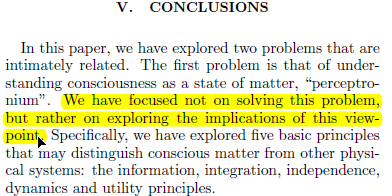“ I understand your argument to be that consciousness contradicts materialism because it doesn’t share the same properties. But materialism simply views consciousness as arising from the material world, that the properties of the mind (e.g. non-physical) exist within a materialist framework, so I don’t think this is a contradiction.”
That is a flawed philosophical perspective, not scientific. There are a couple of problems with this statement. One is that to have properties, there must be some form of matter. (matter being a material substance) Consciousness does not have “properties”. It is not a material substance.
I’m going to sprinkle some quotes from Max Tegmark, a well respected MIT physics professsor who wrote this paper that exists in different edited formats, on what he conjectures “Consciousness As A State Of Matter.”
https://ghayb.com/wp-content/uploads/2015/09/1401.1219v2.pdf
A. Consciousness in physics
“ A commonly held view is that consciousness is irrelevant to physics and should therefore not be discussed in physics papers. One oft-stated reason is a perceived lack of rigor in past attempts to link consciousness to physics. Another argument is that physics has been managed just fine for hundreds of years by avoiding this subject, and should therefore keep doing so. Yet the fact that most physics problems can be solved without reference to consciousness does not guarantee that this applies to all physics problems.”
“ In this paper, I conjecture that consciousness can be understood as yet another state of matter. Just as there are many types of liquids, there are many types of consciousness. However, this should not preclude us from identifying, quantifying, modeling and ultimately understanding the characteristic properties that all liquid forms of matter (or all conscious forms of matter) share”
Science does not necessarily deny the existence of pre existing or pervasive forms of energy that we cannot quantify. We know and can quantify radiation emitting from the brain. If we didn’t have brain scan technology, we wouldn’t know that fact. The brain serves the same function, it acts a processor or scanner for what prexisted the organic brain, in terms of thoughts or “consciousness”
“ For example, does the non-observability of spacetime regions beyond horizons imply that they in some sense do not exist independently of the regions that we can observe?”
Physics defines supernatural on starkly different independent terms than religion and philosophy. Physics in particular, does not deny the existence of the supernatural, material, etherial, or otherwise. Only Materialism does that, on materialistic terms. Laws of physics are not necessarily absolute. What is material only exists in the materialistic framework, before it eventually tranfers into another form of energy.
Any philosophical perspective can literally mean anything to the philosopher who sees the world through his philosophical prism. Philosophy explained the world as best it could before science became more advanced. Philosophy only explains human behavior, it cannot explain quantum mechanics, or the creation and the evolution of life forms, or how life forms are able to process survival data, conscious or stimulus response.
In Epistomological terms, religion coins consciousness as metaphysical. You cannot call something that is formless and elusive as consciousness “material”, simply because it is processed by the same material chemical means that allows everything else we perceive to seen, known, or understood. Consciousness, magic, or even will to power in Black Magic , have no basis in matter or materialism as we know it. None whatsoever. Even though such phenomena is the vehicle for magical change in our material universe.
“ Why are you conscious right now? Specifically, why are you having a subjective experience of reading these words, seeing colors and hearing sounds, while the inanimate objects around you are presumably not having any subjective experience at all? Different people mean different things by “consciousness”, including awareness of environment or self. I am asking the more basic question of why you experience anything at all, which is the essence of what philosopher David Chalmers has termed “the hard problem” of consciousness and which has preoccupied philosophers throughout the ages (see [5] and references therein). A traditional answer to this problem is dualism — that living entities differ from inanimate ones because they contain some non-physical element such as an “anima” or “soul”.”
“ Support for dualism among scientists has gradually dwindled with the realization that we are made of quarks and electrons, which as far as we can tell move according to simple physical laws.”
Only problem is, consciousness does not have a particle! Material products, matter or energy, are created by quantum mechanical means that can be measured. Consciousness is not manufactured because we have a brain. It is only perceived because we have a more sophisticated brain than mammals or amphibians. Our thoughts can perceive rocks, but the rocks are already there. We percieve light, air, sight, smell, and sound that all of which would exist without us. We know gravity exists but we cannot put it on a table and analyze it. So wherever consciousness comes from, the materialist version of consciousness is the product of wishfull thinking, no pun intended. It is not only flawed thinking, it is absolutely wrong.
We as humans percieve everything through our brain because that happens to be the way we evolved. Whatever Nature is, Satan, God, Buddha, Dark Energy, Entropy, we know nature works it’s own magic, but we don’t know how. Why? That doesn’t accomplish anything.
If we percieved it through our kidneys, it wouldn’t make any difference, if the result was the same. If we as humans had no brain, that does not mean we could not live, evolve, or survive. It simply means our way of processing reality in terms of survival would be slightly different than that of a Jelly Fish.

